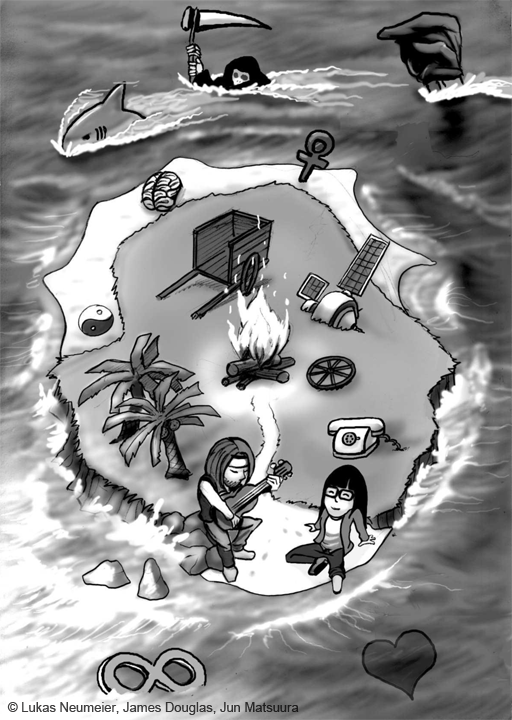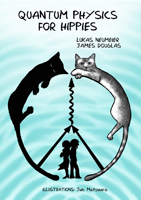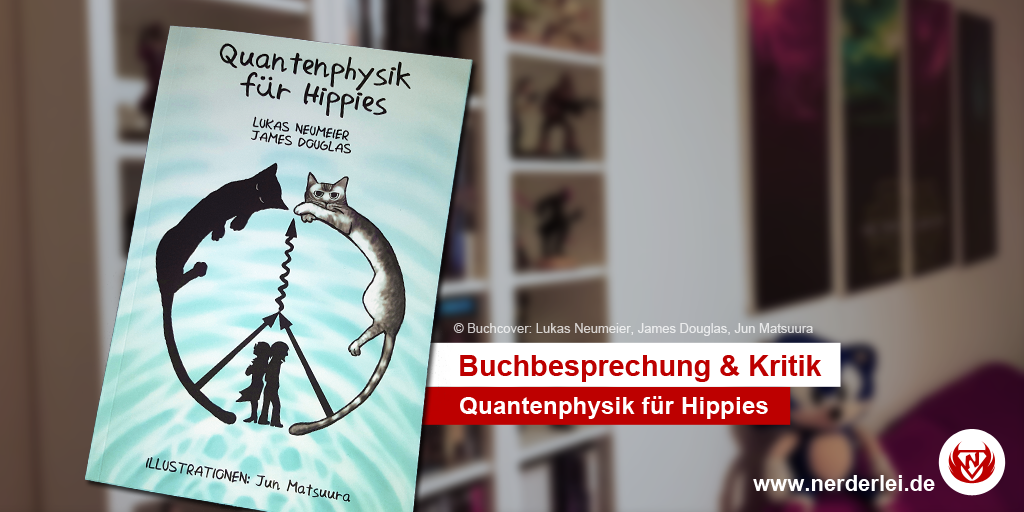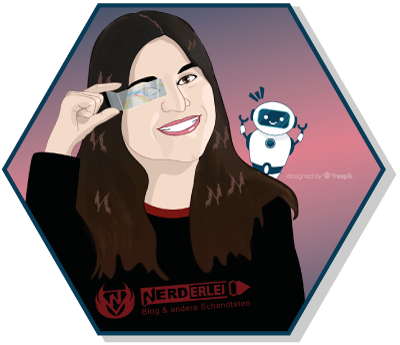"What? A scientific textbook on quantum physics? You read that? And more importantly: you can understand that?! And why quantum physics for hippies? You're not even a hippie!" These and other questions I have had to put up with from my circle of friends recently. Completely wrongly, since this book is not even a textbook, but a novel that explains the subject matter in a way that is understandable for normal mortals. Of course, I couldn't understand a textbook on quantum physics that easily. After all, quantum physics is one of the most complex and, probably due to its very young age (just under 100 years), also one of the most unfathomed areas of physics. Richard Feynman, a world-famous physicist and Nobel Prize winner, whose research has made a significant contribution to the understanding of quantum field theories, said not without reason: "Anyone who thinks he has understood quantum theory has not understood it.
But now to the basic question: "How do I get to read this book, even though I have no scientific background and am not a hippie?" Well, that's actually completely beside the point. I myself am very interested in all kinds of science fiction topics and I love it when technologies are explained in a comprehensible way, based on real knowledge, which is simply spun further. I often refer to quantum physics, especially when it comes to time travel or parallel dimensions. So I've encountered quantum physics very often, and you've also encountered it when you read Marvel and DC Comics or watch the latest movies and series. When I was asked on Twitter by the author of the book, Dr. Lukas Neumeier, if I would like to read the book and publish my opinion in a review, I was a bit, well, let's say "reserved", because I didn't think I could do that. But when I started to read it, my doubts were immediately dispelled, because it was written really great.
Not what I expected, because it was much more and much better: This is what "Quantum Physics for Hippies" is about
Bob is a cosmopolitan hippie with the education of a studied philosopher, who has just come out of a Tantra session that won't let him go. Lost in thought, he strolls leisurely along the streets of Barcelona, past cafés and restaurants, until he sees a young woman who captures his attention. She sits alone in a small café whose logo is a Yin Yang sign with skulls instead of dots and the corresponding slogan is "Be balanced or die". He just sits down at her table, directly in front of her, without being asked, without saying a word. When she then, after putting on her glasses, opens the conversation with the following words, the inclined reader realizes at the latest that this will be a rather unusual conversation: "At first I thought a huge monkey with a questionable haircut was sitting in front of me. Now I'm disappointed you're just a fucking hippie." The young woman's name is Alice, she is the epitome of a nerd, and as it turns out, a quantum physicist, who despite the initially blatant reluctance seems to be quite interested in how the "monkey" is doing.
What follows is a long, impressive conversation between Bob and Alice about philosophy, spirituality and above all: quantum physics. The resulting tension between the two dissimilar characters helps to keep you tied up and makes you want to know what's next. The two are extremely quick-witted, eloquent and obviously share the same dry humour. Moreover, the topic of conversation is captivating enough in itself.
The reader quasi takes Bob's position, since the book is written as a kind of first-person narrative from his point of view, even though the style is more like a play, since the dialogues are structured according to the pattern of one. I like the style very much, because I have a hook for it. For others, the style could make it more difficult for them to get into the story, because the dialogues might not be as fluent as in a classic novel. That's a matter of taste and everyone has to decide for himself, I liked it very much.
Alice first takes on the role of the mentor in the story and leads Bob and thus the reader into the depths of the rabbit hole called quantum physics. Yes, the name Alice will certainly have been chosen carefully, because the world of quantum physics can certainly be considered a wonderland, because it is just as much behind the veil of reality we know and are aware of, and just as enigmatic and fascinating. But Bob also returns the favour of sharing his knowledge, the roles change and Bob takes the role of a mentor instead of Alice. He in turn teaches Alice and thus also the reader the philosophical and spiritual sides of the world. This frequent change of mentor and thus of subject area also keeps up the tension and also shows how closely these supposedly different views are linked. Moreover, the balance of power remains in balance, neither of the two churning out the other. At all times, the conversation remains at eye level and from equal to equal.
In order to approach the respective topic, Alice and Bob each use many illustrative examples, some of which are demonstrated through practical experiments or, for example, are represented in a metaphor. Many very well done illustrations by Jun Matsuura support the reader's understanding and loosen up the story additionally.
What I also find remarkable is the fact that the topics explained in the book, which have a scientific background, are all backed up by sources. In addition, quotations from well-known physicists, such as Einstein or Schrödinger, are often inserted at appropriate places. In this way, despite the form of a casual novel, the scientific foundation does not fall by the wayside. People who then want to delve even deeper into the subject matter are thus presented with a certain timetable of which works they could start with. An additional advantage of this is also that you don't have to just accept the statements made, but can actually check them.
What could I learn in this book?
For people who are especially interested in quantum physics and hope to find a very easy introduction to the subject and learn some basics with this book, the following topics are waiting for them: The Schrödinger equation (in a highly simplified form), Schrödinger's cat, quantum entanglement, wave-particle duality, probability wave, decoherence, etc.
In addition, topics such as "the map of reality" and consciousness are also covered. In addition, this book clears up various misunderstandings in esotericism, such as "Quantum Healing".
Who is the book's target group?
As already mentioned, the book is intended for "normal mortals", i.e. "non-physicists". It is not a textbook that wants to help budding quantum physicists through their studies. However, the title should also give a hint. The authors claim that the topics explained in the book can also be understood by a 10-year-old or an adult after a few drinks. I don't think they succeeded in doing so completely, but this is simply due to the highly complex topic itself. In many places it is simply a little difficult to digest - even for sober adults. In my opinion, the book is suitable for nerds, hippies, esoterics, spirituals and actually every seeker of meaning and truth who wants to get involved with the topic of quantum physics. I find the book especially recommendable for science fiction fans, because the topic of quantum physics is really very common there and the respective fictional works can only gain by more background knowledge.
If you have seen the following series or movies lately, for example, this book will help you to understand some of the connections better: Man in the High Castle, Marvel Agents of S.h.i.e.l.d. (especially season 4), DC The Flash, Marvels Avengers Endgame, Marvels Dr. Strange, Marvels Ant-Man, Marvels Ant-Man and the Wasp.
Here is a small sample from the book
The following is a 1:1 excerpt from the book, pages 69 to 73 Copyright Dr. Lukas Neumeier, Dr. James Douglas and Jun Matsuura. I have chosen this excerpt because I think it reflects the following things well, even though it hardly touches the core topic of quantum physics: The humor, the tension between the protagonists, the narrative style, the writing style and the way of illustration.
Waiter: "Guys! Haven't you got anything better to do than talk about atoms? I mean, what's the point? What do you care, anyway? Go to the fucking beach and get a tan like everybody else!"
Alice takes a long sip of her beer, raises her head and looks at the waiter.
Alice: "You know, it's surprising that we're the only people in this café with such a charming waiter."
Waiter: "Thanks for the honest compliment. But why must you understand everything? Doesn't trying to explain everything destroy the magic of not knowing? I prefer to live in a world that remains a little mysterious."
I've heard that argument before, but I see it a little differently. I'll give it a shot.
I say, "Well, look at it from this perspective. Let's call the things we understand "knowledge". For example, the way to make a cocktail is knowledge. Or how to make a fire. Now imagine the sum of all knowledge as an island. The island of knowledge. The island is surrounded by everything we don't understand - the ocean of ignorance. Compared to the ocean, the island is tiny. Now where does the magic happen? Where do we feel the mystery? Not in the middle of the island, because everything is known there. And also not far out in the ocean. If something is too far out in the ocean, we can't even perceive it or imagine it. It's so foreign to us that we can't relate it to anything we know."
Waiter: "Yeah, man, the mysterious happens on the beach! That's what I said."
Damn it! He steals my punch line.

I: 'Right. We sense the mysterious when we find unresolved questions that are right on the borderline between what we understand and what we don't know. Exactly where we think we have a good map, but then something unexpected happens, something we cannot explain with our map. There, on the beach, we find questions like 'Why do we love music?', 'What does quantum physics tell us about reality?', 'What does love look like without fear?' or 'How can we heal our destructive conditioning? When we strive for knowledge and explain things that seem mysterious to us today, the island becomes larger. And a bigger island means longer beaches. The border to the ocean of ignorance grows and we experience new phenomena that we cannot explain. Then we can ask more questions. So understanding and explaining things creates more magic and more mystery in our lives. And not less. "
Alice nods. "And let me add that I would be devastated if we ever found out And unemployed. It's the process that's my passion - hanging out on the beach all day. With one foot in the known and the other in the unknown, I feel the mystery of life every day. I believe and hope that the ocean of ignorance is infinite."
„The most beautiful experience we can have is the mysterious one. It is the fundamental emotion that is at the cradle of true art and true science. Anyone who does not know this and can no longer be surprised or amazed is as good as dead, and his eyes are darkened.“
- Albert Einstein
The waiter shakes his head. "So you're not going to the beach because you're already at the beach? At first I thought you might be crazy. Now I'm convinced. Another round of drinks amigos? "
"A quantum wine, please," I say, "it's red and white at the same time."
Alice laughs.
My conclusion on "Quantum physics for hippies"
What I liked best was the relaxed and humorous writing. I also find this mixture of science, philosophy and spirituality great. I found it surprising that you can put such a topic into such a humorous conversation and actually keep the suspense up to the end and then even add an extremely cool twist without it being superimposed or looking like a foreign body. The ending of the book is really great - very surprising twist with an ending that at least made me think about it. The fact that you don't just get a nice novel here, but actually scientific facts are presented in a way that is easy to understand in small, reasonably digestible pieces, is in my opinion a masterpiece of the authors. However, one should not expect too much.
Some things I had to read several times in order to understand them. At some passages I also thought that my brain had decided to disappear briefly into another universe and take a vacation. The book is quite challenging and not a "sucking away" novel, after you suddenly become a professional in quantum physics in a miraculous way.
All in all, I can recommend this book to anyone who wants to learn the basics of quantum physics, e.g. to better understand various science fiction works or just to learn more about the topic itself. It is definitely worth it!
Where can I get the book?
If you've got a taste for it, you can now buy the book in English and German from Amazon, both as a paperback and as a Kindle eBook. Tip: The English version of the Kindle eBook is currently available for free as part of the Kindle Unlimited program.
More information about the book and the authors can be found on the authors' website: www.hippie-nerd.de
Dr. Lukas Neumeier, Dr. James Douglas
Jun Matsuura
Quantum physics for hippies
978-1093231359
26. September 2019
200



 Roboter: © Designed by freepik.com
Roboter: © Designed by freepik.com